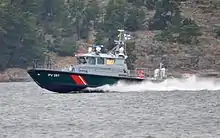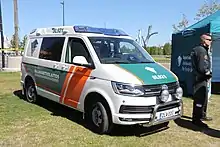| Finnish Border Guard Rajavartiolaitos (Finnish) Gränsbevakningsväsendet (Swedish) | |
|---|---|
 Emblem of the Finnish Border Guard | |
 Ship racing stripe | |
| Abbreviation | FBG |
| Agency overview | |
| Formed | 21 March 1919 |
| Employees | 3,800 career personnel, mobilised strength 12,600 |
| Jurisdictional structure | |
| Operations jurisdiction | Finland |
| Specialist jurisdictions |
|
| Operational structure | |
| Elected officer responsible | |
| Agency executives |
|
| Child agencies |
|
| Website | |
| raja | |
The Finnish Border Guard (FBG,[1] Finnish: Rajavartiolaitos, RVL;[2] Swedish: Gränsbevakningsväsendet, GBV)[3] is the agency responsible for enforcing the security of Finland's borders. It is a military organisation, subordinate to the Ministry of the Interior in administrative issues and to the president of Finland in issues pertaining to his authority as Commander-in-Chief (e.g. officer promotions). The agency has police and investigative powers in immigration matters and can independently investigate immigration violations. The Finnish Coast Guard has search and rescue (SAR) duties, both maritime and inland. Missions inland are often carried out in co-operation with local fire and rescue departments or other authorities.
The Finnish Border Guard consists of 3,800 active duty personnel. Upon mobilization, it would be wholly or partly incorporated into the Finnish Defence Forces and its strength increased with reservists who have served their conscription in the branch. The mobilized strength of the Finnish Border Guard is 12,600 servicemen. The Finnish-Russian border is actively monitored. The western sea borders and the western and northern land borders to Sweden and Norway are free to cross under the Nordic passport union, the Border Guard does however maintain personnel in these regions owing to its SAR duties.
There is a separate Finnish Customs agency, and immigration is also handled by the Finnish National Police and the Finnish Directorate of Immigration. PTR (police, customs and border guard) co-operation is well-developed and allows the authorities to conduct each other's duties if necessary.
Duties and jurisdiction
Main duties of the Finnish Border Guard:
- Protecting the land borders and territorial waters of Finland from unauthorised encroachment.
- Passport control at border crossing points, airports and ports.
- First line of defence against territorial invasions.
- Rescue operations (mainly at sea and in the remote areas of Lapland).
- Provide aid to other authorities such as the fire department in case of unusual events like wild fires.
- Investigation of crimes pertaining to border security.
- Aiding police forces in civil duties such as crowd control and riot control.
- Military operations pertaining to internal security.
- Customs control in the minor border crossing points without customs authorities.
- Training of conscripts for wartime duty. These include rajajääkäri (border jaegers) and erikoisrajajääkäri (special border jaegers).
- (During wartime) Long range patrols and guerrilla tactics behind enemy lines.
For the discharge of its duties, the Border Guard has limited police powers in the areas where it operates. It can, for example, seize and arrest persons and conduct searches in apartments and cars pursuant to same legislation as the police, when investigating a crime. However, the power to arrest a person has been delegated only to the commanding officers of border control detachments and commanders and vice-commanders of larger units.
The Border Guard is not supposed to be used for the keeping of public order under normal circumstances, but it has two readiness platoons that can be used to support the Police in exceptional situations in matters of crowd control and internal security (including incidents involving dangerous armed criminals).[4] The readiness platoons have been used to supplement riot police during high-profile international events where there is a perceived danger of violent demonstrations, e.g. during the "Smash ASEM" demonstration in 2006.[5] However, the main duty of the readiness platoons is to handle the most demanding border security incidents.[4] Border Guard helicopters have also been used to assist police and rescue authorities in various missions.
The Border Guard also has the power to keep public order in its own facilities and in their immediate vicinity. For the execution of its military exercises, any officer with the minimum rank of Captain can close an area temporarily.
The Border Guard is responsible for enforcing the 3–5 km (1.9–3.1 mi) border zone towards Russia and issues the permits to visit the zone.
Organisation

Administrative units are responsible for the functions of the Border Guard. These administrative units are the Border Guard Headquarters, Southeast Finland, North Karelia, Kainuu and Lapland border guard districts, the Gulf of Finland and West Finland coast guard districts, Air Patrol Squadron and Border and Coast Guard Academy.
The Border Guards have two readiness units; the 1st Special Intervention Unit, which operates in South-Eastern Finland, and the 5th Special Intervention Unit, who operates in the Gulf of Finland area.[6]
Training
The basic training of border guard personnel is based in Imatra, while the sea training for coast guards is based in Turku.[7]
Equipment
Watercraft



The Border Guard operates:
Vehicles

The Finnish Border Guard operates by several types of vehicles on soil.
The list of operative vehicles:
- Patrol cars - consisting of different types and models
- All-terrain vehicles
- Snowmobiles
Operative personnel's equipment
Officers carry on a daily basis:
- TETRA
- Glock17, Glock19, Glock26
- Pepper spray
- Taser - model X2 by Axon Enterprise
- Baton (law enforcement)
- Handcuffs
- Light and heavy ballistic armor
- Military working dogs - The Finnish Border Guard has K9 units on every district. The most popular working dog breeds are German Shepherd and Belgian Malinois.
Small arms
Light weapons:
- Rk 95 TP
- Rk 62 - several versions
- Heckler & Koch G36
- Glock pistols
- TRG-42
- CZ Scorpion Evo 3
- Heckler & Koch HK416
Heavy arms
Heavy weapons:
- NSV machine gun
- PK machine gun
- Automatic grenade launcher
- APILAS
- Rocket-propelled grenade
- Grenade
- Explosive weapon - explosives and mines
Aircraft


The Border Guard operates 14 aircraft, including 12 helicopters. The AB 412s are to be replaced by new twin-engined helicopters, while the Super Pumas and Dornier 228s are being modernized.
| Aircraft | Type | Versions | In service[12] | Notes |
|---|---|---|---|---|
| AgustaWestland AW119 | utility helicopter | AW119Ke | 4 | Built by Agusta |
| Bell 412 | transport helicopter | AB 412 AB 412EP | 4 1 | Built by Agusta |
| Eurocopter Super Puma | transport helicopter | AS 332L1 H215 | 1 4 | All helicopters modernized to the H215 standard as of 2022. |
| Dornier 228 | maritime patrol aircraft | Dornier 228-212 | 2 | To be replaced. |
MVX Programme
The Border Guard has announced that due to increasing problems with Dornier 228's, they are to be replaced by new aircraft. With a budget of 60 million euro, a letter has been sent to around 20 suppliers. Candidates include the Airbus C295 MSA, ATR 42 and ATR 72, and the Bombardier Challenger 650.[13][14] In April 2022, the budget of the Dornier 228 MVX replacement program was increased to 163 million euros, along with other defence spending boosts in wake of the 2022 Russian invasion of Ukraine.[15]
The MVX programme has received a total of 14 different offers. During the selection process the types were reduced, and consists currently of three jet-powered aircraft:[16]
Lighter aircraft
Larger, propeller-driven turbine powered aircraft, either new or used
Used:
New:
Jet-engined aircraft
The final candidates for the complete package are:[18]
- Field Aerospace
- L3Harris Technologies
- Sierra Nevada Corporation
- St Airborne Systems
History

After the Finnish Civil War in 1919, the control of the Finnish borders was given to the former Finnish Russian frontier troops under the command of the Ministry of Interior. Until 1945, only the Russian border was supervised by the Frontier Guard, the Swedish and Norwegian borders having only customs control. In 1929, a separate Sea Guard was founded to prevent the rampant alcohol smuggling caused by the Finnish prohibition of alcohol (1919–1932).
At the start of the Winter War there were nine Border Companies (Rajakomppania) on the Karelian Isthmus. North of Lake Ladoga the Frontier Guards were combined into six Detached Battalions (Erillinen pataljoona). Further north in Petsamo the defence was left to the 10th Detached Company (10. Erillinen komppania). After the war marshal Mannerheim awarded all frontier guards the title "Border jäger" (Rajajääkäri). During the Continuation War, the Frontier Guard companies were combined into 12 Border Jäger battalions (Rajajääkäripataljoona) and later during the Lapland War into a Border Jäger Brigade (Rajajääkäriprikaati).
Ranks
Commissioned officer ranks
The rank insignia of commissioned officers.
| NATO code | OF-10 | OF-9 | OF-8 | OF-7 | OF-6 | OF-5 | OF-4 | OF-3 | OF-2 | OF-1 | OF(D) | Student officer | ||||||||||||||||||||||||
|---|---|---|---|---|---|---|---|---|---|---|---|---|---|---|---|---|---|---|---|---|---|---|---|---|---|---|---|---|---|---|---|---|---|---|---|---|
| Kenraali/ Amiraali |
Kenraaliluutnantti/ Vara-amiraali |
Kenraalimajuri/ Kontra-amiraali |
Prikaatikenraali/ Lippueamiraali |
Eversti/ Kommodori |
Everstiluutnantti/ Komentaja |
Majuri/ Komentajakapteeni |
Kapteeni/ Kapteeniluutnantti |
Yliluutnantti/ Yliluutnantti |
Luutnantti/ Luutnantti |
Vänrikki/ Aliluutnantti |
Upseerikokelas | Upseerioppilas | ||||||||||||||||||||||||
| General/ Amiral |
Generallöjtnant/ Viceamiral |
Generalmajor/ Konteramiral |
Brigadgeneral/ Flottiljamiral |
Överste/ Kommodor |
Överstelöjtnant/ Kommendör |
Major/ Kommendörkapten |
Kapten/ Kaptenlöjtnant |
Premiärlöjtnant | Löjtnant | Fänrik/ Underlöjtnant |
Officersaspirant | Officerselev | ||||||||||||||||||||||||
Other ranks
The rank insignia of non-commissioned officers and enlisted personnel.
| NATO code | OR-9 | OR-8 | OR-7 | OR-6 | OR-5 | OR-4 | OR-3 | OR-2 | OR-1 | |||||||||||||||||||||||||||
|---|---|---|---|---|---|---|---|---|---|---|---|---|---|---|---|---|---|---|---|---|---|---|---|---|---|---|---|---|---|---|---|---|---|---|---|---|
| No insignia | ||||||||||||||||||||||||||||||||||||
| Rajavartiomestari | Ylirajavartija | Vanhempi rajavartija | Nuorempi rajavartija | Ylirajajääkäri | Rajajääkäri | Alokas | ||||||||||||||||||||||||||||||
| Bevakningsmästare | Överbevakare | Äldrebevakare | Yngrebevakare | Övergränsjägare | Gränsjägare | Rekryt | ||||||||||||||||||||||||||||||
Current activities
After the Second World War, the Border Guards were placed on all Finnish borders. In the 1950s, the Sea Guard was attached to the Border Guard. Since then, the Border Guard has received a fine public image. It is famed for the wilderness skills of its guards foot-patrolling the forest-covered Russian border, its good efficiency in catching the few illegal border crossers and for the fact that it is the only state authority in large parts of Lapland. In these matters it resembles the popular image of the Royal Canadian Mounted Police. The Border Guard of Finland is one of the links of the chain of protectors of the external borders of the European Union and Schengen agreement.
Nearly every Border Guard District trains small number of conscripts for long range reconnaissance (Finnish: Sissi). Conscripts in Border Guard companies are mostly volunteers and preferably selected from the occupants of border areas, and while trained by Border Guard, they do not perform regular border control duties. Rivalry between Sissi from Border Guards and Defence Forces is traditionally high.
Employment in Border Guard is much sought for, especially in North and Eastern Finland, which suffer from chronic unemployment problems. Typically a vacancy in the Border Guard receives at least 50 applications.
See also
- Crime in Finland
- Finnish Security Intelligence Service
- Frontex (The European Agency for the Management of Operational Cooperation at the External Borders of the Member States of the European Union)
- Law enforcement in Finland
- National Bureau of Investigation (Finland)
- Police of Finland
References
- ↑ "Border Guard: Rise in Syrians entering Finland illegally through Russia". Yle Uutiset. 23 June 2015. Retrieved 14 October 2023.
- ↑ Pulliainen, Mikko (14 October 2022). "Rajavartiolaitokselle uutta valvontakonekalustoa etsivä MVX-hanke etenee: Nyt on valittu ne konetoimittajat, jotka kutsutaan tarjouspyyntökilpailuun". Tekniikka&Talous (in Finnish). Retrieved 14 October 2023.
- ↑ Lehtihaara, Maarit (10 June 2018). "Räcker det att man vilar på hanen?". Hufvudstadsbladet (in Swedish). Retrieved 14 October 2023.
- 1 2 Valmiusjoukkueet Archived 2017-10-29 at the Wayback Machine. Finnish Border Guard. Retrieved 2015-07-07. (in Finnish).
- ↑ Smash ASEM: mielenosoitus joka ei koskaan alkanut. Yle Elävä arkisto. 10.1.2012. Retrieved 2015-07-07. (in Finnish)
- ↑ "Flashbang - 5th Unit & 1st Unit".
- ↑ Lindberg, Camilla, ed. (2020). Ett rum för alla – Folktingets arbete för svenskan i Finland under 100 år (in Swedish). Helsinki: Swedish Assembly of Finland. ISBN 978-952-9700-61-5.
- ↑ "Griffon 2000TD". www.griffonhoverwork.com.
- ↑ "Watercat 1300 Patrol". www.marinealutech.com.
- ↑ "RV90". tyovene.com.
- ↑ "The Border Guard's vessels and aircraft". www.raja.fi.
- ↑ "World Military Aircraft Inventory", Aerospace Source Book 2007, Aviation Week & Space Technology, January 15, 2007.
- ↑ "Nopeammin, korkeammalle, voimakkaammin: Rajavartiolaitos haluaa kaksi uutta, suurta valvontalentokonetta". Ilta-Sanomat (in Finnish). 15 April 2021. Retrieved 14 May 2021.
- ↑ "Rajavartiolaitoksen valvontalentokoneet ovat elinkaarensa päässä – 25 vuotta palvelleille koneille pitäisi löytää seuraaja". ts.fi (in Finnish). 14 August 2020. Retrieved 14 May 2021.
- ↑ "Puolustukseen yhteensä kaksi miljardia euroa, työmarkkinatukeen 20–30 euron aikaistettu korotus – hallituksen johto kertoi talouspäätöksistä". Yle Uutiset (in Finnish). 5 April 2022. Retrieved 5 April 2022.
- ↑ "MVX-hankkeessa ehdolla 14 erilaista konetyyppiä - Rajavartiolaitoksen Dornierit korvattava pikaisesti | lentoposti.fi". 15 April 2021.
- ↑ "Rajavartiolaitos tutustuu MVX-hankkeessa Embraer Praetor 600 -liikesuihkukoneeseen Turussa | lentoposti.fi". 26 July 2022.
- ↑ "Rajavartiolaitoksen monitoimilentokoneiden hankinta etenee".